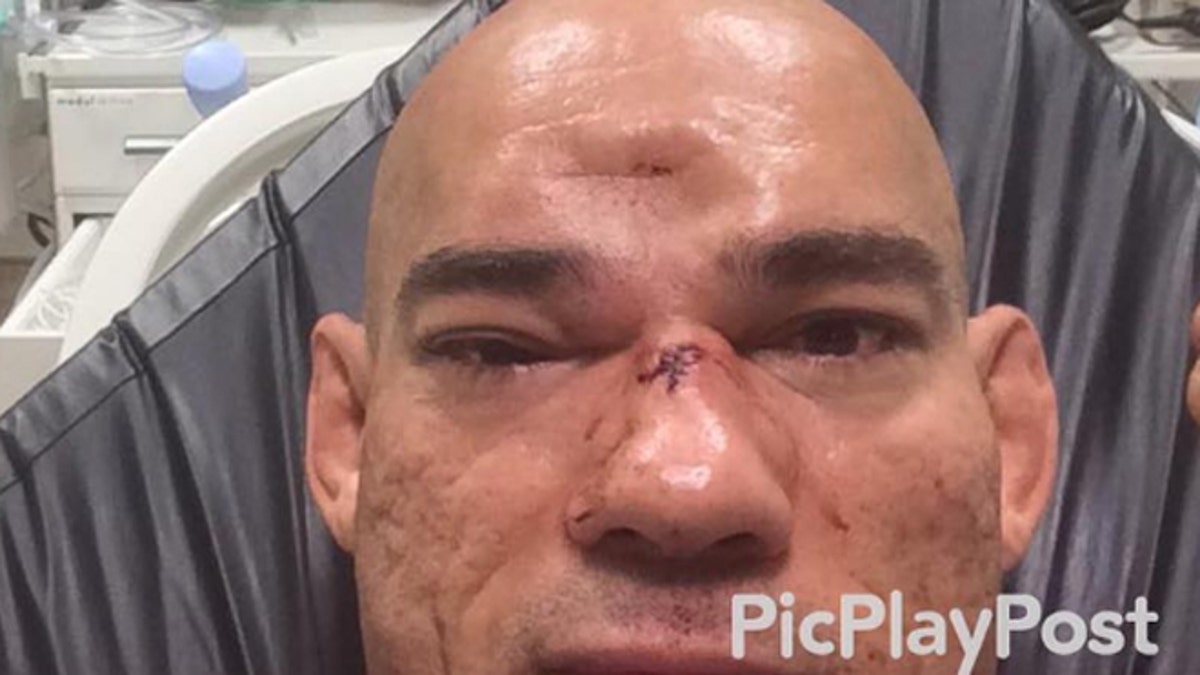
Evangelista "Cyborg" Santos suffered a skull fracture in last week's bout. (@Criscyborg Instagram)
While the dangers associated with playing professional football and other contact sports are well-documented, the Mixed Martial Arts (MMA,) Ultimate Fighting Championship (UFC) and World Wrestling Entertainment (WWE) continue operate somewhat under the radar as their athletes enter the cage or ring and fight until what seems like an inevitably early death.
Last week, MMA fighter Evangelista “Cyborg” Santos took on Michael Page in one of the most contested bouts of Bellator 158. Fans of all ages tuned in to Spike TV to witness Page land a “jumping knee” in the center of Cyborg’s skull, resulting in a massive skull fracture and brain swelling. According to his ex-wife, Cyborg is currently hospitalized in London where doctors are preparing to operate but are unsure of when he will be able to return to the U.S.
Even worse, is that Cris Cyborg claims her ex-husband told her that he will be ready to fight again in just three months, and while Bellator reportedly will pay for his medical bills and prize money, there has been no talk of any rule changes to ensure this type of brutal injury does not happen again. The consequences of such a horrific and traumatic injury go well beyond the physical. Neurologically, Cyborg will be lucky to escape without the typical side effects associated with such a traumatic brain injury, like memory loss, tremors or depression.
While the MMA and UFC is relatively new to mainstream media, we are only just beginning to see the effects of the long-term damage done at the hands of the WWE, a well-established fixture in many homes. On Monday, the organization was hit with a lawsuit filed by dozens of retired wrestlers who accuse the industry of concealing the risk of head trauma and putting corporate gains ahead of wrestlers’ safety and health. It’s not the first time Vince McMahon’s company has been accused of “selling violence,” but others in the industry are critical of the move. Former wrestler Bob Holly took to Twitter to call the lawsuit “absolutely ridiculous.”
The problem with the “macho mentality” of Cyborg, Holly and others who think that it’s normal behavior to risk your neurological health for the sake of entertainment and prize money is the message that it sends to the younger generations. You only get one brain, and it takes nothing short of a miracle to repair that brain should it be injured. A neurological injury often results in a permanent disabling condition. We know that in the world of contact sports, whether you are talking about boxing, football or hockey, even mild recurrent concussions have been linked with permanent brain disorders. These athletes are at an increased risk for depression, suicide and violence. What I fear most, is that with millions of eyes watching, one of these fighters will endure a fatal injury for the sake of so-called entertainment.
This type of lawless gladiator sport will soon force the hands of elected government and health officials to intervene and ask when enough is enough? I urge these organizations to seriously consider implementing a series of changes for the sake of their athletes’ safety. I also encourage parents to monitor their children’s fascination with these fights carefully, and to stress that any stunts featured on the highlight reel are performed by trained professionals. The organizations may not be willing to discuss the importance of brain health and safety with athletes and fans, but that doesn’t mean that we shouldn’t be.
